|
Printables |
PowerPoints |
Online exercises |
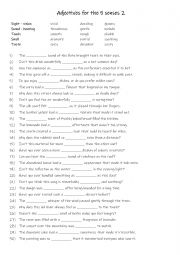
|
A2+-B1 Adjectives for the 5 senses 2
Students should learn adjectives for the five senses (sight, sound, touch, smell, and taste) because they enhance descriptive language and make communication more vivid and engaging. Using specific adjectives like vivid or gloomy for sight, melodic or thunderous for sound, and smooth or rough for touch allows students to convey precise impressions ...
Level: intermediate
Age: 9-100
Type: worksheet
Downloads: 118
|
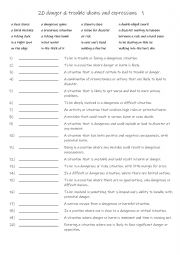
|
B1+-C1 20 danger & trouble idioms and expressions 1
Learning danger and trouble idioms offers numerous benefits. It enhances comprehension by helping students understand common expressions in everyday conversation and media. These idioms provide cultural insights, showing how native speakers view risk and challenges. They also allow students to express complex ideas concisely and vividly, making the...
Level: intermediate
Age: 12-100
Type:
Downloads: 113
|
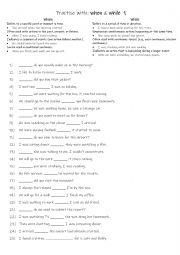
|
A2-B1 Practise with when & while 1
Students should learn when and while as they are essential for describing time relationships and creating complex sentences. When is used to pinpoint specific moments or sequences of events, such as "I heard a noise when I opened the door." While is used to describe actions happening at the same time, such as "She was singing while he was playing t...
Level: elementary
Age: 9-100
Type:
Downloads: 121
|
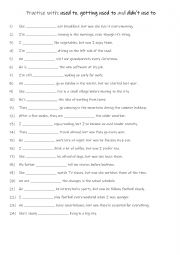
|
A2+-B1 Practise with used to, getting used to and didn�t use to
Students should learn used to, getting used to, and didn�t use to because these expressions are essential for describing past habits, changes, and adaptations. Used to highlights actions or states that were regular in the past but no longer occur, while getting used to focuses on the process of adjusting to new situations. Additionally, didn�t ...
Level: intermediate
Age: 9-100
Type:
Downloads: 131
|
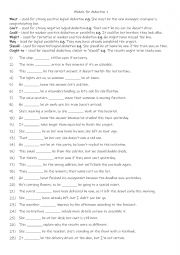
|
A2-B1 Modals for deduction 1
Students should learn modals for deduction because they enable them to express logical reasoning and assumptions clearly and effectively. These modals help students distinguish between varying degrees of certainty, from strong conclusions ("must") to tentative possibilities ("might" or "could"). By mastering these, students can communicate more pre...
Level: elementary
Age: 9-100
Type:
Downloads: 109
|
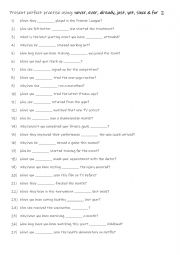
|
A2+-B1 Present perfect practise using never, ever, already, just, yet, since & for 2
Practising the present perfect with words like never, ever, already, just, yet, since, and for is essential for students as it enables them to discuss experiences, recent events, and ongoing situations with clarity. These time markers help convey whether actions are completed, in progress, or relevant to the present, which is crucial for effective ...
Level: intermediate
Age: 10-100
Type:
Downloads: 122
|
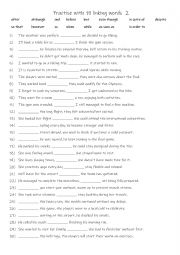
|
A2+-B1 Practise with 15 Linking words 2
Students should learn these linking words because they are essential for creating complex, logical sentences that convey relationships such as contrast (although, however), cause and effect (so that, in order to), and time (before, as soon as). Mastering them enhances writing and speaking by making language more sophisticated and engaging, as stude...
Level: intermediate
Age: 10-100
Type:
Downloads: 111
|
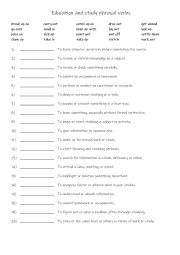
|
B1 20 education and study phrasal verbs
Students should learn education and study-related phrasal verbs because they are commonly used in everyday English and enhance both spoken and written communication.
These phrasal verbs are widely used in academic and professional contexts, making it easier for students to understand and participate in conversations or instructions related to edu...
Level: intermediate
Age: 9-100
Type:
Downloads: 112
|
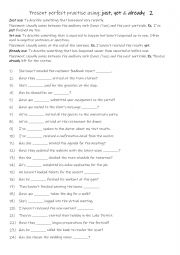
|
A2-B1 Present perfect practise using just, yet & already 2
Learning the present perfect tense with just, yet, and already is essential because these time adverbs allow students to express recent actions, expectations, and accomplishments clearly and concisely. Just helps highlight very recent actions (e.g., I have just finished my homework), making communication precise and current. Yet is vital for asking...
Level: elementary
Age: 10-100
Type:
Downloads: 109
|
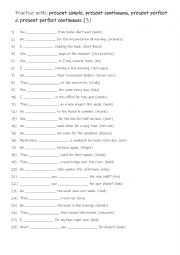
|
A2+-B1 Practise with present simple present continuous, present perfect & present perfect continuous (3)
Learning and practicing the Present Simple, Present Continuous, Present Perfect, and Present Perfect Continuous tenses is essential for clear communication in English. These tenses help students to express actions and events in different time frames�whether they are habitual, happening now, or linked to the past. Mastering these tenses improves acc...
Level: intermediate
Age: 9-100
Type:
Downloads: 112
|
|
|
|
|












